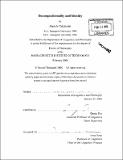Decompositionality and identity
Author(s)
Takahashi, Shoichi, Ph. D. Massachusetts Institute of Technology
DownloadFull printable version (9.960Mb)
Other Contributors
Massachusetts Institute of Technology. Dept. of Linguistics and Philosophy.
Advisor
Danny Fox.
Terms of use
Metadata
Show full item recordAbstract
The Scope of quantificational phrases (QPs) is often not represented in surface structures, in the sense that a constituent that is, on the surface, sister to a QP is not necessarily interpreted as its argument semantically. QPs can take wider or narrower scope than their surface position (Scope Widening and Scope Narrowing). Based on the fact that when an elided constituent contains a variable that takes part in a particular type of binding dependency, the biggest deletable constituent must be elided, Chapter 2 argues that the presence of this maximization effect in the context of Scope Widening is straightforwardly explained by syntactic approaches, in which QPs undergo movement to widen their scope, rather than by semantic approaches, which adopt type shifting rules to deal with Scope Widening. Chapter 3 defends the copy theory of movement, which captures the effects of Scope Narrowing in a simple way, by developing a new theory of the counter-cyclic merger, which accounts for the facts that seem challenging to this theory. Those facts have been taken to indicate that movement sometimes leaves a trace. I propose that restrictors of determiners can merge with them counter-cyclically. Copies of determiners without their restrictors turn into syntactic objects that receive the same interpretation as that assigned to a trace. (cont.) This is done by the independently motivated procedure that converts movement chains into interpretable objects. Chapter 3 demonstrates that together with other properties of grammar, this approach explains the challenging facts, and yet is compatible with the copy theory. Chapter 4 investigates the nature of the scope assignment mechanism by examining the fact that the scopal possibilities of comparative QPs (e.g., more than three books) are more restricted than other QPs. It demonstrates that this fact is captured by the interplay of the decompositional approach, in which comparative QPs are decomposed into two QPs (e.g., -er than three and many books), and independently motivated constraints on the scope assignment (e.g., locality and Scope Economy in Fox 2000). Thus, their peculiar scopal behavior can be taken as additional evidence for the core properties of the scope assignment mechanism.
Description
Thesis (Ph. D.)--Massachusetts Institute of Technology, Dept. of Linguistics and Philosophy, 2006. Includes bibliographical references (p. 198-210).
Date issued
2006Department
Massachusetts Institute of Technology. Department of Linguistics and PhilosophyPublisher
Massachusetts Institute of Technology
Keywords
Linguistics and Philosophy.